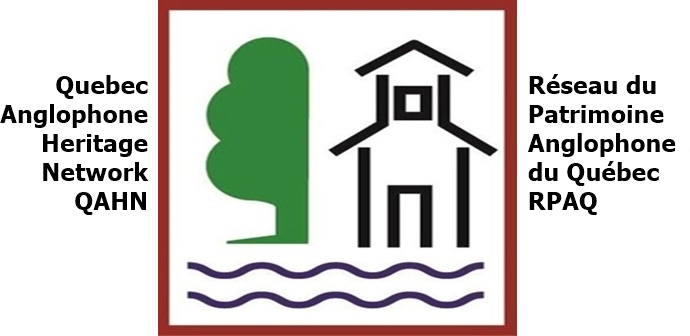

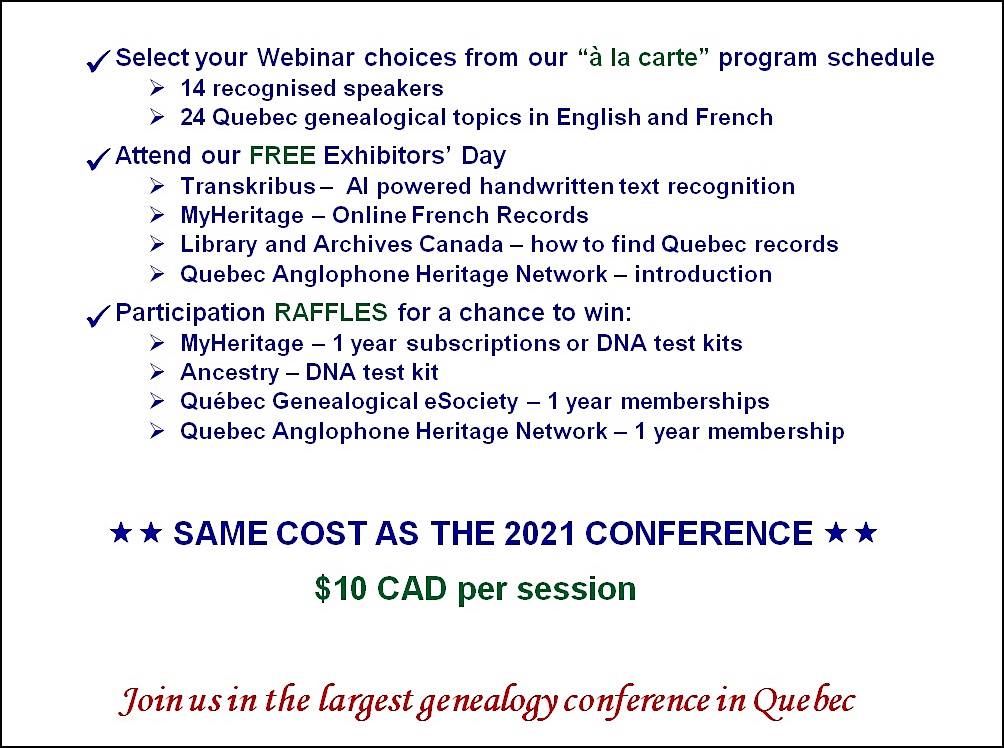
To print the program

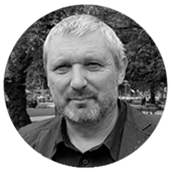
Title: Handwritten Text Recognition with Transkribus
Presenter: Günter Mühlberger
Language: English
Time: 11:00 - 12:00
Description: General introduction to Transkribus and the READ-COOP, focusing on what is possible and which kinds of projects we work together with, some details about the technology behind and a small outlook on what should be achieved in future.
Transkribus is a comprehensive platform for the digitisation, AI-powered text recognition, transcription and searching of historical documents – from any place, any time, and in any language.
Click here to register
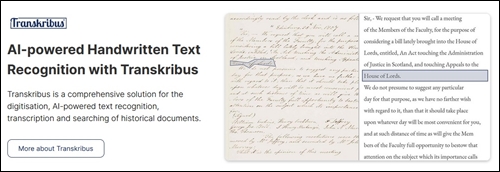
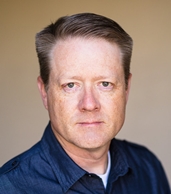
Title: Online French Records and Research at Filae, MyHeritage, and Beyond
Presenter: Mike Mansfield, MSLIS
Language: English
Time: 13:00 - 14:00
Description: Success in finding and documenting our French ancestors is increasingly enabled by online historical records and indexes that help us find these incredible records. In this session we will learn about the historical records available at Filae and MyHeritage and how to use them effectively. We will conclude with strategies and a road map of how to use resources available at French departmental archives and the Bibliothèque nationale de France.
Click here to register

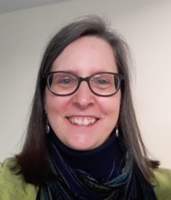
Title: Sur les traces de vos ancêtres dans les collections de Bibliothèque et Archives Canada
Presenter: Sophie Tellier
Language: French
Time: 15:00 - 16:00
Description: Lors de cette présentation, nous jetterons un coup d’œil aux divers outils de BAC à la disposition des généalogistes sur la trace de leurs ancêtres québécois. En plus de pages web dédiées à l’histoire familiale, ces outils comprennent des publications (répertoires de mariages, dictionnaires spécialisés, histoires de familles), des documents d’archives (listes de passagers, dossiers militaires, recensements, archives familiales) et des bases de données (BMS2000, Ancestry). Nous terminerons par un bref aperçu des sources non-disponibles à BAC.
Click here to register

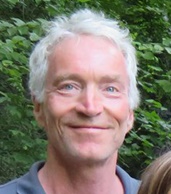
Title: Quebec Anglophone Heritage Network
Presenter: Dwane Wilkin
Language: English
Time: 17:00 - 17:30
Description: General introduction about the Quebec Anglophone Heritage Network (QAHN). Many Quebecers have links to Anglophone heritage even though they see themselves as having some other linguistic or cultural attachment. There are also many communities in Quebec that communicate in English but whose members do not come from what are traditionally thought of as English-speaking countries. QAHN does not focus exclusively on the heritage of the British Isles, but on all groups that expresses themselves in English.Similarly, there are many instances where Anglophone heritage is being preserved by members of Quebec’s French-speaking community. QAHN, therefore, speaks of Anglophone heritage as a field of interest. QAHN is non-political and totally inclusive. QAHN's concern is with the preservation of the English-speaking community’s heritage, not with language. Membership in QAHN is open to individuals, families and organizations, regardless of linguistic or cultural affiliation.
Click here to register

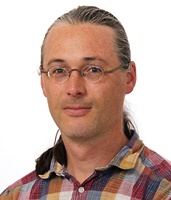
Title: Transkribus : associer l’Intelligence artificielle à la science participative pour transcrire de vastes corpus de documents manuscrits.
Presenter: Maxime Gohier
Language: French
Time: 19:30 - 20:30
Description: Survol des fonctionnalités du logiciel Transkribus et présentation d’exemples précis de résultats d’utilisation de l’intelligence artificielle pour la reconnaissance automatique des écritures manuscrites, tirées du projet de recherche Nouvelle-France numérique. Mise en évidence des possibilités offertes par le logiciel Transkribus pour tirer profit de la science participative (crowdsourcing) afin d’améliorer les résultats de l’intelligence artificielle.
Click here to register



Title: Les communautés Mohawk de Akwesasne, Kanehsatake et Kahnawake
Presenter: Eric Pouliot-Thisdale
Language: French
Time: 09:00 - 10:00
Description: M. Pouliot-Thisdale va discuter les informations contenues dans les registres et recensements associés ainsi que les modifications des noms de familles apparues de 1880 à 1921; de noms traditionnels aux noms à connotations anglophones et francophones !
TIRAGE d'une adhésion d'un an à la Société Généalogique Virtuelle du Québec
Click here to register and pay
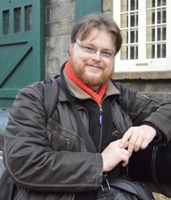
Title: Less suspicious than men: The challenges and methods of finding women on the war front in New France
Presenter: Joseph Gagné
Language: English
Time: 11:00 - 12:00
Description: Many historical works retrace soldiers and officers who travelled to New France, giving particular attention to those who married and settled. These are useful tools for any genealogist wanting to find an ancestor who served defending the colony. Yet, the men of the French army did not always come alone: many women also crossed the ocean, following their husbands. This talk will present the challenges and methods of retracing women who came to Canada during the Seven Years’ War (1754-1763).
Click here to register and pay
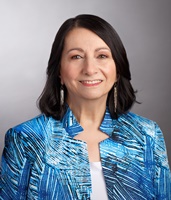
Title: The French-Canadian Identity of Alcina Furkey
Presenter: Margaret R. Fortier
Language: English
Time: 13:00 - 14:00
Description: Alcina Furkey's birth name and her parents' identities were unknown in 19C Vermont. Alcina had many forenames: Alcenia, Arsena, Christina, Elcena, Elena, Jane, Josephine, Julia, Lucy, and Reusta, and Rosanna. But none of them was her baptismal name. Reconstructing her birth family, together with a connection found in deeds and the clues in Catholic records, led to her real identity.
Click here to register and pay
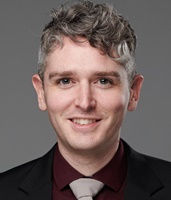
Title: L’avenir des tests ADN en biologie judiciaire : la généalogie génétique pour identifier des corps et pour résoudre des affaires criminelles jusque-là non élucidées
Presenters: Tommy Harding, Isabelle Bachand & Diane Séguin
Language: French
Time: 15:00 - 16:00
Description: Depuis son invention dans les années 1980, le test ADN en sciences judiciaires s’est à maintes reprises révélé indispensable à la résolution d’affaires criminelles et pour identifier les restes de personnes disparues. Entre autres, il met en lumière l’implication d’un criminel grâce à des concordances obtenues entre les profils génétiques décelés sur une scène de crime et ceux contenus dans la Banque nationale de données génétiques (BNDG) du Canada. Cependant, malgré la découverte de preuves ADN sur une scène, une enquête peut stagner si le profil du malfaiteur est absent de la BNDG et si toutes les pistes d’investigation ont été épuisées. Dans ces cas, l’union de la généalogie et de la génétique à travers les bases de données privées, accessibles au public, telles FamilyTreeDNA et GEDmatch, peut faire surgir de nouvelles informations cruciales à la résolution de crimes graves. Comment fonctionne la généalogie génétique en sciences judiciaires ? A-t-elle déjà fait ses preuves dans le cadre d’enquêtes criminelles ou lors de la découverte de restes humains non-identifiés ? Devriez-vous accepter de rendre disponibles vos informations généalogiques et génétiques à des fins d’investigations policières ? Via sa participation indispensable à la méthode, le citoyen voit entre ses mains le pouvoir d’aider les victimes et leurs familles à obtenir justice.
Click here to register and pay

Title: Past is Present: Using First World War Digital Military Records to Discover Your Family History
Presenter: Caitlin Bailey
Language: English
Time: 17:00 - 18:00
Description: Users of Canadian genealogy records have a largely untapped digital resource available to them to trace the history of their family during the 20th Century – Canadian Military Records. Library and Archives Canada completed an ambitious digitization project in 2018 for the centennial of the Great War to render all available First World War personnel files digital. This is in addition to extensive LAC collections of war diaries, casualty cards, grave records, and other important military documents.
However, military documents tend to remain used by a small subset of genealogical researchers; they are difficult to read and require knowledge not only of military abbreviations, but also military organization and military history.
Caitlin Bailey, Executive Director and Curator of the Canadian Centre for the Great War, will walk you through accessing and using Canadian First World War records in your research. In this workshop, you will learn what is available on the LAC site for consultation and how to glean information from service files, death records and war diaries.
Click here to register and pay
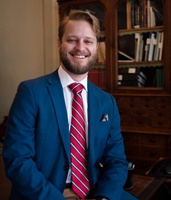
Title: Voir du pays : l'immigration militaire au 18e siècle au Québec
Presenter: Philipp Portelance
Language: French
Time: 19:30 - 20:30
Description: Plusieurs connaissances le régiment des Carignan-Salières et leur impact sur la démographie canadienne. Leur arrivé est même reconnu comme un élément patrimonial. Cependant, ils ne représentent qu'une infime partie de l'immigration militaire au Québec, qui représente plus du tiers de l'immigration au 18e siècle. Dans cette conférence il sera question de ces autres troupes militaires et des diverses cultures qu'ils amènent avec eux au Canada.
Click here to register and pay


Title: Moins soupçonnées que les hommes : Les défis et les pistes pour retrouver les femmes sur le front de guerre en Nouvelle-France
Presenter: Joseph Gagné
Language: French
Time: 09:00 - 10:00
Description: Plusieurs études historiques retracent les soldats et les officiers qui voyagent en Nouvelle-France, portant une attention particulière sur ceux qui se marient et s’installent. Ce sont-là des outils utiles pour tout généalogiste souhaitant trouver un ancêtre qui a servi à la défense de la colonie. Pourtant, les hommes de l’armée française ne traversent pas nécessairement seuls : de nombreuses femmes vont aussi franchir l’océan, accompagnant leurs époux. Cette communication présentera les défis et les méthodes pour retracer les femmes qui viennent au Canada pendant la guerre de Sept Ans (1754-1763).
Click here to register and pay

Title: The Mohawk communities of Akwesasne, Kanehsatake and Kahnawake
Presenter: Eric Pouliot-Thisdale
Language: English
Time: 11:00 - 12:00
Description: Mr. Pouliot-Thisdale will discuss the information contained in the registers and associated censuses as well as the changes in family names from 1880 to 1921; from traditional names to names with English and French connotations!
Click here to register and pay
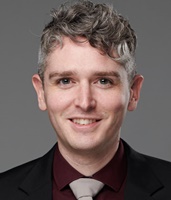
Title: The Future of DNA Testing in Forensic Biology: Genetic Genealogy for Identifying Human Remains and Solving Cold Cases
Presenters: Tommy Harding, Isabelle Bachand & Diane Séguin
Language: English
Time: 13:00 - 14:00
Description: Since its creation in the 1980’s, forensic DNA testing has been essential in solving criminal cases and identifying the remains of missing persons. For example, it can link a person to a criminal act if genetic profiles obtained from a crime scene match the ones found in the Canadian National DNA Data Bank (NDDB). However, despite the availability of DNA evidence, an investigation can stall if the perpetrator’s profile is absent from the NDDB and if all investigative leads have been exhausted. In these cases, the combination of genealogy and genetics through private, but publicly accessible, databases like FamilyTreeDNA and GEDmatch can shed light on crucial information that is useful in solving crimes. How does investigative genetic genealogy work? Has it already helped solve criminal cases or identify missing persons remains? Should you make your personal data accessible to the police force? By playing a pivotal role in the application of this method, citizens have the power to help victims and their families obtain justice.
Click here to register and pay

Title: Going on an adventure : Quebec's military immigration in the 18th century
Presenter: Philipp Portelance
Language: English
Time: 15:00 - 16:00
Description: Many know of the Carignan-Salières regiment and their impact on Canadian demography. Their coming has even been recognized as an element of Canadian heritage. However, they represent only a fraction of military immigration in Quebec, which represents more than the third of all immigration in the 18th century. In this lecture, we will discuss these other military troops and the diverse cultures they bring with them to Canada.
Click here to register and pay
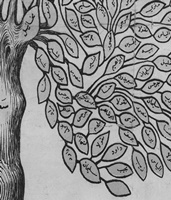
Title: Family genealogy and genealogical research in the sociological study of the Syrian-Ottoman immigrant experience in early-20th-century Québec
Presenter: Brian Aboud
Language: English
Time: 17:00 - 18:00
Description: In this talk, I will address the way that family genealogy has contributed to the examination of the circumstances of Syrian-Ottoman immigrants in late-19th and early-20th century Québec and to the constitution of that experience as a particular instance and example of immigrant experience. Genealogical data, collected over many years and by various means, has been of analytical use in several respects including the following: it reveals how kin and family relations gave a particular structure to the Syrian-Ottoman immigrant presence in Québec; it helps to understand the role of familial ties in strategies of settlement and survival in a migration situation; it illuminates the role of genealogical ties, imaginaries and narratives in the relations of power that were internal to the group. Attention to genealogy is also useful for an understanding of the formation of ideas about self and other within the group and between the group and those beyond its boundaries.
Image credit: Detail of a family tree of a Syrian immigrant family in Montreal, circa 1920. Aboud-Ghattas family collection.
Click here to register and pay
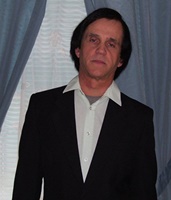
Title: The Windham County Loyalists and the Settlement of the Eastern Townships
Presenter: Jim Manson
Language: English
Time: 19:30 - 20:30
Description: The settlement of the Eastern Townships between 1792 and 1814 represented the final phase in the colonization of New England's northern frontier. The pioneer period in Northern New England was initiated a quarter century before the American Revolution thanks to the land allocation policy of New Hampshire Governor Benning Wentworth. Wentworth's scheme for self-enrichment encouraged the migration of thousands of New Englanders to Vermont.
Many of these Vermonters, including Luke Knowlton, Samuel Gale, Micah Townsend and Samuel Wells of Windham County, remained loyal to Britain during the American Revolution. These Loyalists, along with Knowlton's son-in-law Samuel Willard, became important figures in the settlement of the Eastern Townships.
The Windham County Loyalists and other pro-English middle class Americans including Captain Henry Ruiter, the leader of the Potton settlers, were destined to become key players in the British plan to establish an elite on the Townships' frontier after 1792. The creation of a landed gentry was part of a plan to maintain a social balance in Lower Canada in order to avoid a repetition of the American Revolution. The scheme failed because the Government of Lower Canada was divided over the issue of land grants to Americans. It also failed due to the facility with which speculators were able to abuse the Leader and Associate system - the land allocation scheme introduced by Chief Magistrate William Smith. Many of these speculators were members of the Executive Council and Land Committee.
When they finally obtained a portion of the land that had been pledged to them by the Land Committee a decade earlier, the Windham County Loyalists actively sought to enhance their own economic welfare by buying and selling more Townships' real estate. However, they also attempted to encourage other Americans to take up residence on the Townships' frontier as they, or members of their families, had already done. By the War of 1812 the Windham County Loyalists and their American neighbours shared a common lifestyle and perspective. Like the other settlers, Samuel Gale and Samuel Willard opposed the military draft since they realized that their own economic welfare was inexorably linked to their ability to attract more American settlers to the Townships.
Click here to register and pay

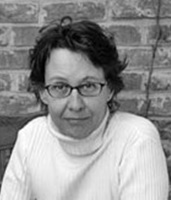
Title: Journaux en ligne – Trucs et astuces
Presenter: Denyse Beaugrand-Champagne
Language: French
Time: 09:00 - 10:00
Description: Cette présentation vise à permettre aux chercheurs en généalogie d’obtenir des résultats probants lors d’une recherche dans les journaux en ligne. Finies les frustrations, découvrez trucs et astuces et partez à la découverte des journaux du 19e et 20e siècle pour enrichir votre histoire de famille d’informations nouvelles et d’illustrations.
Click here to register and pay
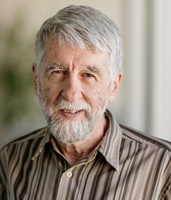
Title: Several quirks in French Protestant genealogy including marriages repeated twice.
Presenter: Richard Lougheed
Language: English
Time: 11:00 - 12:00
Description: French Protestant genealogy presents its own challenges. I will discuss these challenges, provide you with sources, and share discoveries. These discoveries will include interesting statistics, remarriages and rebaptisms, and anglicizations. I will conclude with several interesting stories.
DRAW for 1 year membership to the Québec Genealogical eSociety
Click here to register and pay

Title: ADN autochtone et métissage fondateur à la baie des Chaleurs
Presenter: Pierre Gendreau-Hétu
Language: French
Time: 13:00 - 14:00
Description: La critique de l’auto-autochtonisation a fait ressortir le peu d’ancêtres amérindiens que comptent vraiment les francophones du Québec. Cette réalité historique se vérifie d’autant mieux que la population laurentienne bénéficie sur quatre siècles d’archives civiles parmi les plus exhaustives au monde. Une telle richesse empirique contraste à plus forte raison avec la pauvreté documentaire qui touche une communauté ancienne comme la baie des Chaleurs en Gaspésie. Or l'éclairage des données génétiques combinées aux sources classiques a permis de rétablir les origines du peuplement dans cette région historique située aux confins du Québec et du Nouveau-Brunswick. Les travaux généalogiques récents menés par le Projet Québec ADNmt y ont identifié une douzaine de matriarches amérindiennes par lesquelles s’est produit un important métissage fondateur aux 17e et 18e siècles.
Click here to register and pay

Title: Newspapers On-Line – Tips and Tricks
Presenter: Denyse Beaugrand-Champagne
Language: English
Time: 15:00 - 16:00
Description: This presentation aims to enable genealogy researchers to obtain convincing results when searching online newspapers. No more frustrations discover tips and tricks and explore newspapers from the 19th and 20th centuries to enrich your family history with new information and illustrations.
Click here to register and pay
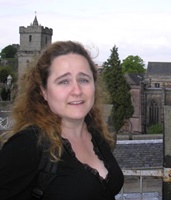
Title: La face publique des montréalais britanniques
Presenter: Gillian Leitch
Language: French
Time: 17:00 - 18:00
Description: Les soirées à Montréal au dix-neuvième siècle était rempli avec des réunions, fêtes, séminaires, performances théâtrales, et des bals de dance. Les Britanniques (Anglophones) résident à Montréal on crée un réseau compliqué des associations, clubs et institutions qui fournit les espaces sociale, intellectuelle et fait la charité.
Cette présentation va examiner le développement des sociétés volontaires, et les façons que les britanniques s’organise leurs vies, supporter leurs compatriotes dans des temps difficile, et préserver leur identités ethniques (Anglais, Ecossais, Irlandais, Gaulois, et Britannique).
Click here to register and pay
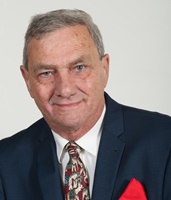
Title: The Irish & Quebec
Presenter: Fergus Keyes
Language: English
Time: 19:30 - 20:30
Description: Many people are under the mistaken impression that the majority of the Irish arrived in Quebec during the famine years of 1847-8. In reality, on the first census taken in New France, in 1663, the name of at least one Irishman is noted as living in the territory.
Fergus Keyes will take you on an interesting journey of Irish immigration to Quebec from the 1600’s until today. When, and why, did these Irish immigrate to Quebec? Who are just a few of the prominent Quebec citizens with Irish heritage that contributed to our current society? Why has there always a strong bond between the Irish & French in Quebec? And he’ll note that the Irish adoption of more French sounding names in the 1600’s and 1700’s often presents a problem for individuals doing genealogy research.
Click here to register and pay


Title: Les Annuaires municipaux - incontournables
Presenter: Denyse Beaugrand-Champagne
Language: French
Time: 09:00 - 10:00
Description: L’objectif de cette formation est de découvrir la richesse méconnue des annuaires municipaux disponibles en ligne. Les annuaires municipaux ne sont pas que des listes de noms et de prénoms, ils recèlent beaucoup d’informations susceptibles d’enrichir votre histoire de famille et ils peuvent vous aider à retracer une lignée manquante.
Click here to register and pay
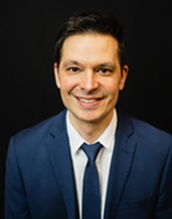
Title: La colonisation de l'Acadie. 1632-1654
Presenter: André-Carl Vachon
Language: French
Time: 11:00 - 12:00
Description: Après la capitulation de Port-Royal en 1654, 34 familles et 7 célibataires restent en Acadie, soit 176 personnes. Qui sont-ils ? Quand sont-ils arrivés en Acadie ? Sous quel règne sont-ils venus ? Celui de Razilly (1632-1636), celui de Menou d’Aulnay (1636-1650) ou celui de La Tour (1651-1654) ? À partir des lettres, mémoires, déclarations, récits et actes notariés de cette époque, André-Carl Vachon nous apporte une nouvelle perspective sur la colonisation durant cette période.
Click here to register and pay

Title: Indigenous DNA and Foundational Crossbreeding at Chaleurs Bay (Gaspé)
Presenter: Pierre Gendreau-Hétu
Language: English
Time: 13:00 - 14:00
Description: The criticism of self-indigenization has stressed that few Native ancestors actually contributed to New France’s demographic growth in the St. Lawrence Valley. This historical fact proves especially true that the Québec population benefits from arguably the world’s most comprehensive civil records. This empirical depth over four centuries highlights all the more the poorer archives available in an ancient community like Chaleurs Bay in the Gaspé peninsula.Yet the combination of genetic data with documentary sources has set the historical record straight as far as population ancestry is concerned in this heritage area bordering Québec and New Brunswick. A recent genealogical study conducted in the framework of the Quebec mtDNA Project identified the input of a dozen matriarchs from the First Nations and their part in the noticeable crossbreeding with Europeans that regionally occurred in the 17th and 18th centuries.
Click here to register and pay

Title: City Directories On-Line – A Must
Presenter: Denyse Beaugrand-Champagne
Language: English
Time: 15:00 - 16:00
Description: The objective of this presentation is to discover the little-known wealth of municipal directories available online. City directories are not just lists of first and last names, they contain a lot of information that can enrich your family history and they could help you trace a missing line.
Click here to register and pay
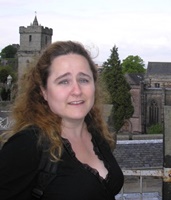
Title: The Chain Migrations of an Irish Family: the Cuddys of Montreal, New York and beyond
Presenter: Dr. Gillian Leitch
Language: English
Time: 17:00 - 18:00
Description: John Patrick Cuddy and his siblings began leaving their hometown of Swinford, County Mayo, Ireland in the 1840s. This presentation will discuss the process of uncovering the lives and migrations. This story took years of work, and involved newspapers, school records, burial records, court records, church records, and DNA. Brick walls were partially chipped away, and a complicated story emerged.
This research uncovered a wider family network connecting the Cuddys in Montreal, St. Paul (MN), New York City and Abbeville (SC). Over the 19th century members of the family moved between these places – what does this tell us about immigration? The Cuddys?
Click here to register and pay

Title: Des complications en généalogie franco-protestante y compris des mariages célébrés deux fois
Presenter: Richard Lougheed
Language: French
Time: 19:30 - 20:30
Description: La généalogie de protestantisme français présente quelques défis. J’en discuterai, vous donnerai des ressources, and partager des découvertes. Ces découvertes incluront des statistiques intéressants, des remariages et re-baptêmes, et l’anglicisation. Je conclurai avec des histoires intéressantes.
Click here to register and pay

